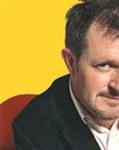[2011 trends] The year SA's radio industry gets the serious jolt needed
![[2011 trends] The year SA's radio industry gets the serious jolt needed](https://biz-file.com/c/1101/64287.jpg?2)
At the beginning of last year, I started explaining to radio leaders that they have to fundamentally change the way they see radio. It's no longer about broadcasting a product, or what I call 'old radio'. 'New radio' is about 'connecting'.
Connect
During 2010, a number of events seemed to echo my sentiment, and the term 'connect' seemed to inch further forwards in the lexicon of those driving technical and social innovation. In July last year, when the world's smartest thinkers convened in Oxford for the TEDGlobal Conference, the ringing mantra was "chance favours the connected world".
And later in the year, when Microsoft released its eagerly anticipated new Xbox controller-free entertainment platform that completely revolutionised gaming, what did it call it? Kinect.
In 2010, driven by the explosion of social media, the word 'connect' seemed to be everywhere where people were trying to incorporate the latest social trends into their products or services. Everywhere that is, except radio.
Fundamentally human
The radio industry in South Africa seemed desperate to retain its stature within the realm of 'old radio'. It thought the growing electronic media space was something it could simply trawl through to fine-tune its product. It failed to realise that it was now colonised by social media - the second phase of the democratisation of the media - and bristling with people reaching out and connecting with each other, not because they could, but because to do so is fundamentally human.
And it is this that has brought about a revolutionary change in the way radio needs to operate, communicate, and even speak with its audience. In brief, it has completely changed the game.
With that in mind, here are the 11 trends to expect in radio in 2011:
- Celeb-jocks - in the fight to grab the attention of an audience at increasing ease with creating and disseminating its own electronic content, radio stations will fight back with their access to one of the cornerstones of social media chatter - celebrities. Expect stations to lure TV, music, comedy and socialite celebrities - with little or no radio experience - behind the microphone to host their own radio shows.
- The next big thing - for too long, stations have downplayed the personality of their radio talent in favour of the station brand. Expect higher profiles of leading radio talent in an attempt to boost their celebrity status. The question is: who will be the next big thing, and which station will create them?
- The growth of NTR - for decades, consumers have been tolerant of commercials as a necessary evil of traditional programming. However, social media is, to a large degree, commercial free; and consumers are becoming increasingly intolerant of the obtrusive nature of commercials. 'New radio' stations will have to become increasingly creative in their implementation of non-traditional revenue streams.
- More talk - radio is no longer about broadcasting content to an audience, it's about connecting with that audience; and the most effective way to do this is through the spoken word. Music station PDs should ignore this at their peril.
- Well-planned spontaneous programming - with democratisation of the media comes spontaneity of expression. Say goodbye to firmly structured and repetitive programming. 'New radio' will be designed around fluid and creative, but carefully balanced, programming.
- Radio gets real - expect the language of radio to change. 'Jockspeak' speaks volumes of how a presenter sees the listener - as a distant consumer they are speaking to. New radio demands that presenters speak as if they see the listener as much closer - someone they are speaking with.
- Radio gets responsible - the monolithic mentality of corporate media will have to recognise that they will have to touch base with their consumers more. Get out of the studio and mix with the masses. In 2011 the shift in corporate social responsibility will be from 'corporate' to 'social responsibility'.
- Radio as social media hub - if consumers are going to talk, create and share content, let them do it through their favourite radio station. A radio station that becomes a social media hub will become a relevant radio station.
- More producers - outside of talk format radio, producers are normally only found on morning and afternoon drive shows. With an emphasis on the need to continually process content across different media streams, every daytime presenter will need a wingman. Producers will become more necessary and top producers worth their weight in platinum.
- Growth of community stations - as consumers connect with those in their social media community, they will look for a radio station they can connect with. Community stations provide this, and often with fewer commercial intrusion.
- Radio apps - in the third quarter of 2010, over 77 million smartphones were shipped around the world, and the market for these phones has increased by a staggering 78%. Already, 10% of Clear Channel's digital audience tune in on their smartphones. In 2011, if your station isn't designing an app to be used on these phones, you're not going to be heard on your audiences' preferred mobile device.
Yes, 2011 is going to be an interesting year indeed, but only for those with the insight to change. For the rest: expect to lose listeners.
 For more:
For more:
- Biz Trends 2011: Marketing & Media South Africa
- Biz Trends 2011: Marketing & Media Africa
- Biz Trends 2011: Retail
- Twitter Search: #biztrends2011




































